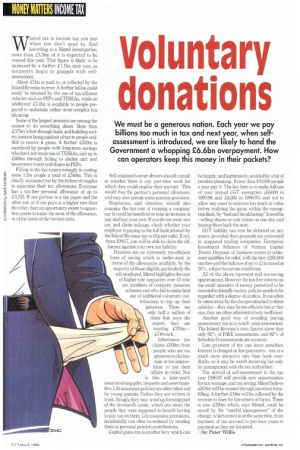Voluntary donations
Page 29

If you've noticed an error in this article please click here to report it so we can fix it.
We must be a generous nation. Each year we pay billions too much in tax and next year, when selfassessment is introduced, we are likely to hand the Government a whopping £6.6bn overpayment. How can operators keep this money in their pockets? Wasted tax is income tax you pay when you don't need to. And according to a Mintel investigation, more than .C5.5bn of it is expected to be wasted this year. That figure is likely to be increased by a further kl.lbn next year, as taxpayers begin to grapple with selfassessment.
About klbn is paid to, or collected by the Inland Revenue in error. A further billion could easily be retained by the use of tax-efficient vehicles such as PEPs and TESSAs, while an additional k3.4bn is available to people prepared to undertake rather more complex tax planning.
Some of the largest amounts are among the easiest to do something about. More than 4:575m is lost through bank and building society interest being paid net of tax to people endtied to receive it gross. A further £359m is sacrificed by people with long-term savings who have not made use of TESSAs, and up to I-860m through failing to shelter unit and investment trusts and shares in PEPs.
Filling in the tax return wrongly is costing some 1.2m people a total of £540m. This is chiefly accounted for by the failure of couples to maximise their tax allowances. Everyone has a tax-free personal allowance of up to £3,765. If one partner is a tax payer and the other not, or if one pays at a higher rate than the other, then an opportunity exists to apportion assets to make the most of the allowance, or of the lower of the two tax rates. Self-employed owner-drivers should consider whether there is any part-time work for which they could employ their partner. This would free the partner's personal allowance, and may also permit some pension provision.
Employees, and directors, should also examine the tax-cost of running a company car. It could be beneficial to take an increase in pay and buy your own. If you do use your own car, and claim mileage, check whether your employer is paying to the full limit allowed by the Inland Revenue (up to 61p per mile). If not, from 1996/7, you will be able to claim the difference against your own tax liability.
Pensions are an extremely tax-efficient form of saving which is under-used, in terms of the allowances available, by the majority of those eligible, particularly the self-employed. Mintel highlights the case of higher-rate taxpayers over 45 who are members of company pensions schemes and who fail to make best use of additional voluntary contributions to top up their pensions. There are only half a million of them but, says the report, they are wasting £370m— E740 each.
Inheritance tax claims £930m from people who are too generous to the taxman or too improvident to put their affairs in order. Nor is this a later-year's issue involving gifts, bequests and asset-transfers. Life assurance policies are often taken out by young parents. Unless they are written in trust, though, they may wind up forming part of the deceased's estate, which can mean the people they were supposed to benefit having to pay tax on them. Life assurance premiums, incidentally, can often be reduced by treating them as personal pension contributions.
Capital gains tax is another levy which can
be largely, and legitimately, avoided by a bit of prudent planning. Fewer than 100,000 people a year pay it. The key here is to make full use of your annual CGT exemption (£6,000 in 1995/96 and £6,300 in 1996/97) and not to allow any asset to increase too much in value before realising the gains within the exemption limit, by "bed and breakfasting" if need be selling shares or unit trusts on one day and buying them back the next.
CGT liability can now be deferred on any assets, provided their proceeds are reinvested in unquoted trading companies, Enterprise Investment Schemes of Venture Capital Trusts. Disposal of business assets at retirement qualifies for relief, with the first £250,000 tax-free and the balance of up to klm taxed at 20%, subject to certain conditions.
All of the above represent real tax-saving opportunities. However the tax-free interest on the small amounts of money permitted to be invested in friendly society policies needs to be regarded with a degree of caution. It can often be eaten away by the charges attached to these vehicles they may be tax-efficient but at that size, they are often administratively inefficient.
Another good way of avoiding paying unnecessary tax is to watch your assessment. The Inland Revenue's own figures show that only 92% of PAYE assessments, and 82% of Schedule I) assessments are accurate.
Late payment of tax can incur penalties. Interest is charged on late payments—but at a much more attractive rate than bank overdrafts, so it may be worth incurring but only by arrangement with the tax authorities.
The arrival of self-assessment in the tax year 1996/97 will provide new opportunities for tax wastage, and tax saving. Mintel believe 0378m will be wasted through incorrect formfilling. A further kl8m will be collected by the revenue in fines for late return of forms. There is also 1220m which, says Mintel, could be saved by the "careful management" of the change, which comes in at the same time, from payment of tax accrued in previous years to payment as they are incurred.
Li by Peter Willis
















































































































